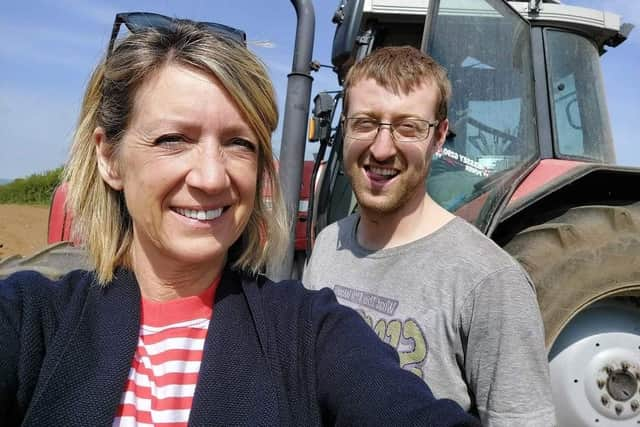Women in agriculture profile featuring Roberta Armstrong
and live on Freeview channel 276
Occupation:
Retired agricultural bank manager, farm owner.
Farming commodity:


Dairy farming. We run a 160 head dairy herd with followers (youngstock). We are in the process of upgrading our systems to simplify processes to make it easier for one person to manage, including converting to robot milking.
How did you become involved in farming?
Honest answer? By default. It was never my intention to be involved in home farm matters. Having looked after everyone else’s farm finances for years, I thought I had earned a well-deserved rest. Unfortunately, that was not to be as my husband was diagnosed with terminal lung cancer and died at 58 years of age. My son was only 26 at the time and had his hands full dealing with all the practical elements of farming. To support him, I took on the farm paperwork including managing finances. I am now on the other side of the banking relationship!
Earliest farming memory:
Advertisement
Advertisement
I can actually remember wheeling the creamery cans out to the end of the lane to be collected. They were transported in a flat bed wheelbarrow which had a wide handlebar so two people could push.
Another memory was getting up to go for a ride with my dad during the summer holidays to take pigs to the Agivy bacon factory which is now no longer there. I also vividly remember running after cattle that had broken out in the middle of the night in my nightie! And who can forget gathering potatoes! I partnered with my brother who helped me empty the basket.
What personal characteristics did you develop from agriculture?
Patience, the farm comes first. If you want something done, either do it yourself or learn to wait. Tolerance. Farmers struggle to be on time, and some don’t understand the concept of tidying up after themselves. Flexibility, how to make a dinner go further.
Life lesson you learnt from farming:
Advertisement
Advertisement
Expect the unexpected – financially, weatherwise and health wise.
What do you enjoy most about the farming lifestyle?
Not being cooped up in an office all day. When the weather is right, there is no better place to be. I just love the sound of tractors working, birdsong, smell of cut grass and of a ploughed field. If I could bottle that and sell it, I would be one rich woman!
Describe a farmer in three words:
Tenacious, resilient and multi-skilled.
What would you like the public to know about Northern Ireland farming?
If you asked someone from a non-farming background to describe a farmer, it would probably be less than flattering. Many would only see muck and the smell, and slow-moving machinery on the road. What they don’t see is the hours they work – farmers can’t go on strike for better pay and conditions.
Advertisement
Advertisement
The level of investment they must make to get a return on their asset – no other business owner would tolerate the level of return a farmer gets. The volatility of prices that they have to accept and the moving targets they have to meet to meet government guidelines. I guess I would like the public to have a better understanding of what a farmer has to do and the sacrifices he/she has to make to produce the food that we take so much for granted.
If you could give farmers/farming families/farming community one piece of advice, what would it be?
I would recommend that every farm family has a discussion, however difficult that may be, about what should happen in a ‘what if’ scenario. This should include how the farm would continue and should take into account not only the practical aspect of farming, but also the administrative side.
I would recommend a written/typed contingency plan with contact details of accountant, solicitor, bank manager, department officials etc., and a diary planner of what to do by when e.g. nitrates calculation, BPS claim, and a line-by-line flowchart of how to complete those claims as navigating some of those sites can be challenging. For many, the loss of a spouse is sudden and there isn’t time to share this information so a farm plan could prove invaluable at a time like this.
What are your hopes for the future of Northern Ireland’s agriculture industry?
That Northern Ireland will be recognised as being a key part of the UK food production chain.